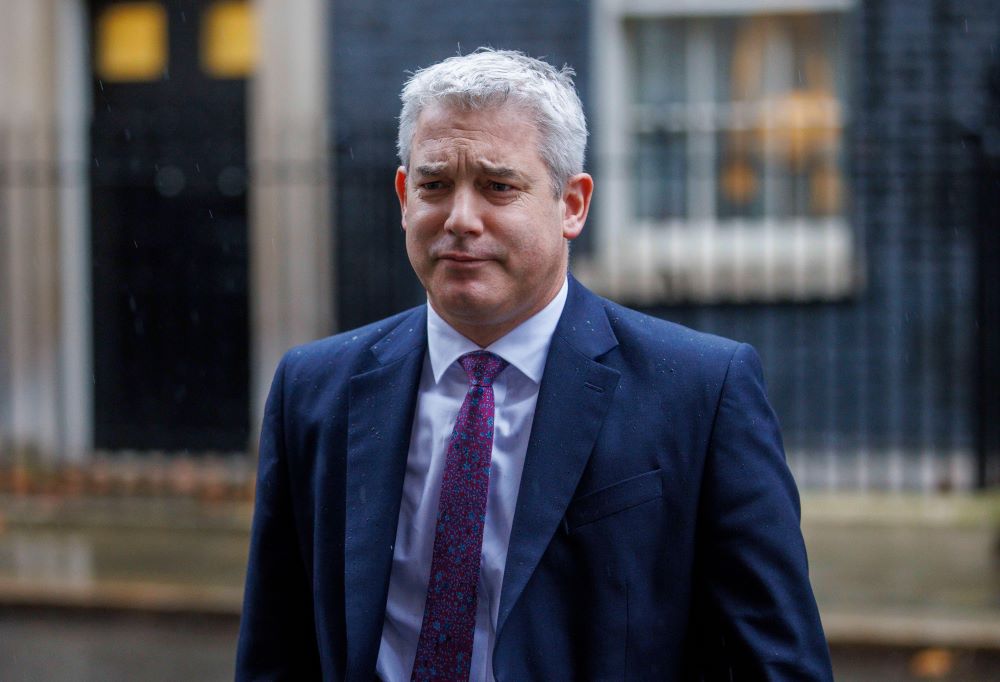Ministers Accused Of Stoking Strike Stalemate By "Playing It Long" On Pay
Nurses on strike outside London's St Thomas Hospital (Alamy)
5 min read
The standoff between the government and unions over public sector pay is showing no signs of ending any time soon as the country braces for a day of mass strike action on 1 February.
Despite months of widespread industrial action, which has seen nurses join the picket line for the first time in their union's history, and soldiers brought in to drive ambulances and check passports, union leaders say ministers are still not even engaging with their demands for pay increases for workers.
Mike Clancy, General Secretary of union Prospect, told this week's PoliticsHome podcast The Rundown he had faced "tumbleweeds" since he met with the government early last week for a fruitless discussion the subject of civil servant pay.
He accused the government of "playing it long" by offering little of substance in discussions with union leaders, allowing ongoing industrial disputes to play out without results.
Prospect is preparing to ballot members who work in government organisations including the Met Office, Environment Agency and UK Health Security Agency, setting up further industrial action in the civil service on top of walkouts in more than 100 government organisations set for next month, Civil Service World reported this week.
Around 100,000 civil servants working in bodies like airports, driving test centres and museums are planning walkouts for 1 February as part of protest over pay by the Public and Commercial Services union. They will be joined by teachers, university staff and train drivers in a day of industrial action which Downing Street this week said would result in "significant disruption".
Unions say they are keen to avoid further industrial action if movement can be made on issues around pay, but many representatives do not believe government is properly engaging in ending the deadlock.
Clancy said he went into last week's meeting expecting the government to bring a negotiating position that could have been the starting point for talks on pay after the union laid out their demands to ministers prior to the discussion. No new parameters for formal talks were offered, however.
“We have cordial discussions, but they're empty of substance, and the last meeting typified that," he told PoliticsHome.
"If a private sector employer convened a discussion with me – as the minister did for 12 January – in a situation of difficulty, I'd expect them to come with the ability to negotiate, not come to the meeting and say ‘we'd like to hear from you’.
"Particularly as we sent a letter before the meeting saying 'let's not have a conversation where we rehearse the arguments you've already heard'."

Unions representing NHS workers who spoke to PoliticsHome at the end of the week, after nurses held two days of strike action, and ambulance workers announced six more, also said attempts to reach a pay settlement with the government had effectively ground to a halt.
Earlier this month it was reported that Prime Minister Rishi Sunak and Chancellor Jeremy Hunt were willing to at least look at ideas on settling NHS pay disputes that were relayed to them by health secretary Steve Barclay following what were considered to be cordial discussions with health unions. Proposals included a one-off winter payment for NHS workers, or backdating a pay rise for next year and sparked some hope that ministers and unions were moving towards a deal that could have averted some strikes.
But the Treasury, backed by the Prime Minister, has made clear that any new pay offers will have to be funded by existing departmental budgets, which Barclay suggested would require "productivity savings".
Most of the cautious optimism quickly dissipated.
“Last week there seemed to be a positive change of tone, with Barclay telling us he wanted to help us make the case to the Treasury," a health union figure told PoliticsHome.
"But you get the impression he was shouted at over the weekend, and now he’s rowed back again."
A former Cabinet minister shared a similar assessment, observing that "the Treasury seems to be winning the day".
Writing for The Independent this week as nurses strikes got underway, Barclay doubled down on the government's 'no new money' position, and warned that giving NHS staff pay rises would mean taking money away from elsewhere in the under-pressure health service.
"I recognise the cost of living pressures on NHS staff and I know how hard they work," he wrote.
"But if we provide unaffordable pay rises to NHS staff, we will take billions of pounds away from where we need it most. Unaffordable pay hikes will mean cutting patient care and stoking the inflation that would make us all poorer."
Nurses on the picket line told PoliticsHome they found Barclay's argument "predictable" and "manipulative".
"We’ve continually seen them pitting the narrative of nurses against patients," David Hendy, a chemotherapy nurse at University College Hospital in London, said. "This is classic government manipulation, smoke and mirrors."
David Nicholson, former Chief Executive of the NHS, this week urged ministers to get back around the negotiating table with the health unions and quickly find a "solution", warning that a strategy of "attrition" would fail and only exacerbate the crisis in staff shortages and retention.
“We’re in a bit of a hole at the moment in terms of the pay negotiations," he told LBC.
"The government needs to do what they're there to do, which is to stop it, to solve the problem.
"If we think we're going to beat down our staff with attrition then it's simply going to create even more problems going forward in terms of recruiting staff and keeping them."
A government source said while it's important that the disputes are resolved quickly, the negotiations are challenging, adding that talks with some public sector unions are more well advanced than others.
With additional reporting from Alain Tolhurst and Zoe Crowther.
